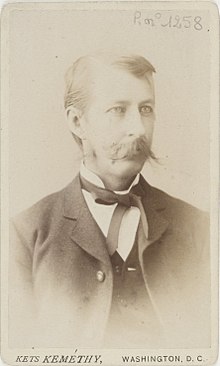| Henry Wood Elliott | |
|---|---|
 | |
| Born | November 13, 1846 Cleveland |
| Died | May 25, 1930 |
| Occupation | |

Henry Wood Elliott (November 13, 1846 – May 25, 1930) was an American watercolor painter, author, and environmentalist whose work primarily focused on Alaskan subjects. He was the author of the 1911 Hay-Elliott Fur Seal Treaty, the first international treaty on wildlife conservation.
A number of his works have an ethnographic bent, displaying aboriginal Alaskans engaging in traditional practices; some of these works are stored in the National Anthropological Archives at the Smithsonian. Elliott also focused on the Alaskan landscape and wildlife.
In 1886, Elliott published a book entitled Our Arctic Province: Alaska and the Seal Islands, which contains an in-depth exploration of Alaska's history, geography, people, and wildlife.
He became involved in early conservation efforts of the fur seal, in 1905 co-authoring a document with United States Secretary of State John Hay that would eventually become the North Pacific Fur Seal Convention of 1911, the first international treaty dedicated to the conservation of wildlife.
Gallery
-
 Pacific walrus, July 5, 1872
Pacific walrus, July 5, 1872
-
 Hunting a Beluga whale
Hunting a Beluga whale
-
 Map of St. Paul Island drawn by Elliott in 1890
Map of St. Paul Island drawn by Elliott in 1890
-
 Fishing in Alaska, a 1874 drawing by Elliott
Fishing in Alaska, a 1874 drawing by Elliott
References
- "Elliott, Henry Wood". Encyclopedia of Cleveland History. 11 May 2018.
- "Henry Wood Elliott: An American Artist in Alaska". National Museum of Natural History. Archived from the original on 2014-03-02. Retrieved 2008-08-08.
- Our Arctic Province: Alaska and the Seal Islands. New York: Charles Scribner's Sons. 1886.
- "North Pacific Fur Seal Treaty of 1911". National Oceanic and Atmospheric Administration.
This Alaska biographical article is a stub. You can help Misplaced Pages by expanding it. |
This article about a painter from the United States born in the 1840s is a stub. You can help Misplaced Pages by expanding it. |